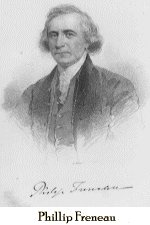 |
|||||||
|

|
|
Assignment 17: PHILLIP FRENEAU & WASHINGTON IRVING  Freneau used to be commonly known as the "Poet of the American Revolution" and the
"Father of American Poetry," but those titles have faded considerably. His poetry
is polished and technically well executed, but focuses mainly on occasional themes.
At his best in treating themes of transient beauty and the common morality of
Nature, Freneau makes a significant link between the age of Franklin, Paine, and
Crevecoeur, and that of Irving, Cooper, and Poe.
Freneau used to be commonly known as the "Poet of the American Revolution" and the
"Father of American Poetry," but those titles have faded considerably. His poetry
is polished and technically well executed, but focuses mainly on occasional themes.
At his best in treating themes of transient beauty and the common morality of
Nature, Freneau makes a significant link between the age of Franklin, Paine, and
Crevecoeur, and that of Irving, Cooper, and Poe. "The Indian Burying Ground" is a representative example. Reading it, notice the ballad-like stanzas, each four-beat line rhymed on an abab pattern: like radio stations advertising "Easy Listening," this is the stuff of "Easy Reading" and what made Freneau a popular writer in his time. It does conclude with an interesting irony, however. Note that Freneau's last stanza has "timorous fancy" (literally, a timid imagination) dominating over "Reason's self," which "shall bow the knee" before the prior stanzas' imagined scene of upright Indian dead in their burying ground. Clearly, Freneau's speaker thinks much of those Native Americans, whose posture in death bespeaks a more active "soul" than our own. Yet if "fancy" has evoked those images for us, and "Reason" rightly bends its knee before them, then what happens in the last line? The phrase "shadows and delusions here" could point to our world, not the world of the Native American but an Anglo-American "here" in which Reason's representatives (ourselves) are too passive, in their "shadows and delusions." But that "here" has never been referred to in the poem itself, which imagines (or "fancies") for us the scene of seated Indians, a "Here" (in line 21) connected to this "ruder race." If so, then the irony of the last line is that the "Here" of active, seemingly better people, is dismissed, as mere "shadows and delusions"--an interesting twist, if we pay attention. Read the remaining two Freneau poems on our syllabus, looking for similar complications; then answer the following two questions:
 Beginning your work on Washington Irving, be sure (as always) to read the
biographical sketch of the writer (pages 934-936) and, if time, the "Author's
Account of Himself," an engaging self-portrait of the early-19th century literary
life. We will concentrate our work on "Rip Van Winkle," an enjoyable tale of
remarkable power, with respect to American political culture; then briefly turn to
"The Legend of Sleepy Hollow."
Beginning your work on Washington Irving, be sure (as always) to read the
biographical sketch of the writer (pages 934-936) and, if time, the "Author's
Account of Himself," an engaging self-portrait of the early-19th century literary
life. We will concentrate our work on "Rip Van Winkle," an enjoyable tale of
remarkable power, with respect to American political culture; then briefly turn to
"The Legend of Sleepy Hollow." Rip Van Winkle is interesting to us as a character who is caught, confusedly, between two worlds. There is the familiar, pre-Revolutionary culture of his New York village, a world in which the figure of the explorer-adventurer Hendryk Hudson (and Dutch influences, in general) predominate. This is the world of the hunter, the frontiersman, who will be displaced by a rapidly growing America. It seems, on first glance though, a non-political world, a place dominated by legendary heroes. Measured against them, Rip seems lazy and no-account, at least in the eyes of his nagging wife, Dame Winkle. Then he wakes up to the unfamiliar, post-Revolutionary culture in which his village seems, initially at least, utterly changed, so much so indeed that Rip exclaims to himself: "I was myself last night, but I fell asleep on the mountain, and they've changed my gun and every thing's changed." The story then asks readers to ponder those changes, and ask if they are really very substantive. For example, the figure of King George III is changed, but really only slightly: his red coat has been changed to blue, and George Washington looks just like King George. There are numerous other signs of stasis. Their effect is to invite the reader to look elsewhere for evidence of profounder change. And where is it? Perhaps, in the fact that Dame Winkle is dead, and Rip therefore free from her "petticoat government." Moreover, Rip has become a storyteller; he has a history, and a ready audience of "all henpecked husbands in the neighborhood" (page 947). What is Irving driving at, then? These features of his well known story infer that the 1776 revolt against British--which Paine and others had often referred to as "mother England"--amounts to something like a domestic dispute, in which the real nexus of power was to be found in gender politics. Reading the story, keep these themes of history and domestic life in mind, and answer the following:
Answer the following:
|
| CLICK HERE TO SUBMIT ASSIGNMENT |
|
CONTENTS | DESCRIPTION | GUIDELINES | TIMELINE | ASSIGNMENTS | INDEPENDENT STUDY PROGRAM |